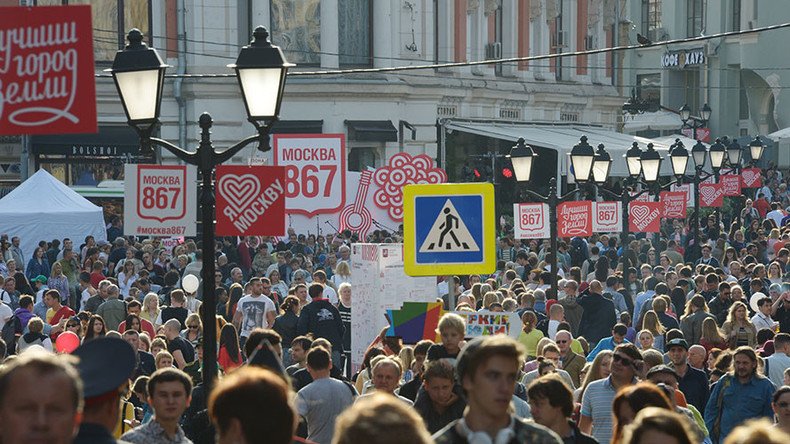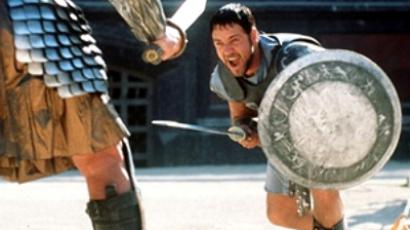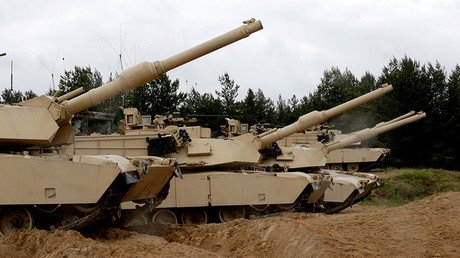From Russia with Peace: Debunking the myth of ‘Russian aggression’

Western pundits are busy peddling a new phenomenon they call ‘Russian aggression’, which they say represents a global threat of the first order. Have the Russians become an aggressive race, or is this just a smokescreen to conceal the West’s own behavior?
Having lived in Russia for nearly 20 years, I like to think I’ve acquired some insight into the Russian mentality and how the Russian people generally react under different circumstances. I can state with certainty that aggression is not an overriding feature of the Russian character. In fact, quite the opposite is true. Thus, it is with alarm that I read hysterical Western reports of ‘Russian aggression’ – claims that curl up and blow away under the slightest scrutiny.
Former US Ambassador to Russia, Michael McFaul, for example, recently penned an opinion piece in the Washington Post [‘How Brexit is a win for Putin’] where he discussed what the Brexit vote means for the EU. Setting aside British opinion in the matter, he drags the phantom of ‘Russian aggression’ into the discussion: “Most importantly, one of the European Union’s most principled critics of Russian aggression in Europe [that is, the United Kingdom] will no longer have a vote in Brussels… The job of EU diplomats fighting to resist Russian aggression, especially those from Estonia, Latvia and Lithuania, just got harder.”
Shorter Applebaum: it's always the Russians pic.twitter.com/XfqQ1L99Hj
— Adam H. Johnson (@adamjohnsonNYC) June 25, 2016
As par for course when it comes to reporting on Russia, concrete examples are rarely needed to support allegations - and irrespective as to how outrageous those allegations may be. Thus, McFaul never informs the reader as to how Russia has been behaving aggressively towards the Baltic States. Apparently it is supposed to be accepted as an article of faith. And for good reason. To be forced to prove such a statement would be quite embarrassing since no such aggression exists. Disagreements yes, as is normal between neighbors that share a fence, but nothing that could be misconstrued as full-blown, in your face military aggression.
Buried deep in the penultimate paragraph, McFaul distorts the historical record to conform with the narrative of ‘Russia aggression’ – a dark force that is personified by, wait for it: “Putin is consolidating strength… mobilizing popular support through foreign war. He stopped NATO’s expansion by invading Georgia in 2008 and slowed EU expansion by invading Ukraine in 2014… As a result of his military intervention in Syria, Putin is expanding Russia’s presence in the Middle East, as Europe and the United States pull back.”
Apparently the reader is expected to ignore, or fail to recall, that Darth Putin was not president at the time of the 2008 Georgian conflict. And yes, Russia briefly “invaded Georgia,” but only after Mikhail Saakashvili ordered a full-scale, crack-of-dawn military attack against the breakaway region of South Ossetia, killing a dozen Russian peacekeepers in the process. Oops. It would have been more honest for McFaul to have mentioned ‘Georgian aggression’, at least in passing, since even the EU admitted tiny Tbilisi was to blame for sparking the conflict.
Regarding the absurd and oft-repeated claim that Russia invaded Ukraine, that bit of sensationalism can be duly refuted by a simple freedom of information request: Please provide one (1) satellite image that shows a single Russian vehicle/soldier/projectile crossing the Ukrainian-Russian border at any time or place during said conflict. The reason why it can’t be produced is because Russia never invaded Ukraine.
And this is precisely how propaganda works: If a monstrous falsehood – in this case ‘Russian aggression’ - is circulated enough times in the rusty public pipeline it magically takes on a life of its own, becoming an unchallenged, uncritical ‘fact’ that only conspiracy theorists would be foolish enough to doubt. A bit like the legendary alligator that lives deep underground in New York City's sewer system. No wonder even the propagators of these Orwellian untruths eventually come to believe in the reality of their fantasy world.
At this point, so-called Russian experts can toss around with gleeful abandon the warped idea of ‘Russian aggression’ with little fear of being called out (except in the reader comments section, which many Western publications have tellingly axed altogether, thank you very much). It should be mentioned that passing off such easily debunked misinformation requires no small amount of contempt for the intelligence of your audience.
(Mis)information war
Claims of ‘Russian aggression’ now represent a significant part of the Western media’s 'information war' against Russia. It has become nearly impossible to peruse an article on Russia these days without being confronted with some variation of the theme. This is a dramatic departure from the recent past, when US officials – in an apparent effort to make Moscow acquiesce to Obama’s missile defense plans for Eastern Europe – unveiled in 2009 the laughable ‘reset’, complete with a red ‘reset’ button that Sergey Lavrov and Hillary Clinton symbolically pressed together in Geneva (US officials mistranslated the word ‘reset’ as ‘overloaded’ - "peregruzka" - which somehow sounds more accurate all things considered).
When it became clear that the reset held as much power as a cereal box decoder ring, and the US had absolutely no intention of cooperating with Russia on missile defense, which they said was designed to protect Europe against ‘rogue states’, the US was forced to cover its tracks with a Russia-bashing campaign that has now reached a crescendo. As a result, 'aggressive' Russia has shed whatever illusions it may have had about a US partnership, something which it truly desired.
Today, much of the delirious hyperbole against Russia is due to Moscow's ability to anticipate Washington’s aggressive geopolitical designs, which ever since 2003 have been focused on regime-change operations against unwilling patients across the Middle East, North Africa and in Ukraine.
For example, instead of Russia entering what would have been a disastrous military conflict in Ukraine, Moscow displayed commendable restraint, opting for nothing more than accepting Crimea into the fold after an overwhelming majority of the peninsula’s population voted to leave Ukraine and join the Russian Federation.
Russia’s next geopolitical move, which should have gained Washington’s trust and friendship, was to conduct a full-scale aerial campaign in Syria against Islamic State, which was somehow running an oil-export operation in addition to its global terrorist campaign. Yet the US inexplicably decried Russia’s surprise move, refusing to share information with Moscow over ISIS locations. Go figure (Note: There is still hope for America, not to mention US-Russia relations: Republican presidential hopeful Donald Trump, for example, proved his foreign policy savvy by applauding Putin's willingness to confront the new global baddies on the block).
What Russian aggression?
In my two decades of living and working in Russia, I have witnessed just a handful of physical altercations. A pair of Russians at odds with each other will be content to spend their time hurling insults and arguments at each other long before the standoff disintegrates into a street brawl. The only way I can explain this tendency to resolve issues without violence is that the Russians are extremely adept at their language – a language that has produced some of the world’s finest poetry and literature – and relish an opportunity to demonstrate their proficiency at it. Of course fights happen, but the threshold for spontaneous violence is much higher, I believe, than in the United States, for example, where a single insult can trigger a five-alarm riot.
Can this national characteristic partially explain America’s predilection for jumping headlong into military conflict? Instead of spending extra time in diplomatic negotiations that may defuse a dangerous standoff, the United States impetuously resorts to military action, which of course only exasperates the problem.
“Unlike many Americans, who see war as an exciting, victorious foreign adventure, the Russians hate and fear war,” wrote a group of Russian analysts living in the United States. Their conclusion should come as no surprise considering the massive toll Russia suffered from World War II.
It is no accident, I believe, that the Russian Federation is popularly portrayed by the bear, a large yet shy animal that goes out of its way to avoid contact and conflict, but one that will become extremely dangerous if unduly provoked. And woe to the hapless hiker who happens to catch a female bear unawares while in the company of her cubs. At that point, running, climbing a tree or both will do little to reduce the complexity of your situation. Better to take your chances with fate and just play dead.
Similar to the ‘aggressive’ bear who must suddenly contend with a group of hunters lurking in an adjacent tract of land, claims of ‘Russian aggression’ are increasing in direct proportion to how close US-led NATO forces approach Russia’s western border. In other words, Russia assuming a defensive posture as NATO carries out massive war games next door in the Baltic States and Eastern Europe is now arrogantly explained as ‘aggressive’ behavior. By way of comparison, please consider what Washington’s reaction would be if Russia were to hold war games with South American countries in the Gulf of Mexico. I think it would be a safe bet to say that US fighter jets, at the very least, would be buzzing those Russian ships.
Before the West’s rhetoric concerning ‘Russian aggression’ morphs into something altogether undesirable, the West should come to the realization that Russia – more so than many other countries on the global stage – possesses a natural ability to negotiate at length in order to defuse any global tensions. Part of this willingness, I believe, derives from its historical appreciation of the spoken and written word, part comes from what amounts to pure intelligence, and part comes from the Russian peoples’ loathing of war, most notably due to World War II, which left an indelible impression on the Russian mentality.
Russia is only as aggressive as the Western imagination needs it to be.
The statements, views and opinions expressed in this column are solely those of the author and do not necessarily represent those of RT.
















